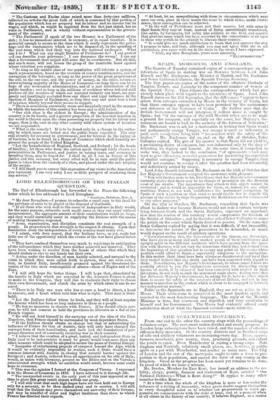LORD ELLENBOROUGH ON THE ITALIAN QUEST ION.
The Earl of Ellenborongh has forwarded to the Times the following letter which he has addressed to Lord Brougham. " Southern, Delabere, Nov. 5. " My dear Brougham—I propose to subscribe a small sum to the fund for the purchase of arms to be placed at the disposal of Garibaldi. " If all those who wish well to the cause of independence in Italy would, for the same purpose, subscribe such small sums as they can spare without inconvenience, the aggregate amount of their contributions would bo large, and they would materially assist in supplying the Italians with the means of making themselves respected. • " Arms, organization, and discipline constitute the real strength of a people. In proportion to that strength is the respect it obtains. Upon that foundation alone the independence of every country must really rest. " I admit, with deep regret, that the Italians have, as yet, made but little use of the opportunity which the events of the war have placed before them.
" They have confined themselves very much to rejoicings in anticipation of the independence which they have neither achieved nor deserved. They have been waiting to receive from the hands of others that which they should disdain to owe to any hands but their own. " Acting under the direction of men hastily selected, and unequal to the crisis in which they were called forth to govern, they are even now, I fear, in Central Italy, insufficiently prepared against the threatened in- vasion of the two most contemptible of armies—those of Naples and of the Pope. I will still hope for better things. I will hope that, stimulated by the insults to Italy which are conveyed in the demands France is about to make in the Congress, they will rise to vindicate their right to choose their own Government, and clutch the arms by which alone it can be se- cured.
" There is in Italy one man who has at once a head to direct, a hand to execute, and a heart which tells him what is right. That man is Gari- baldi.
" Let the Italians follow where he leads, and they will at least acquire the honour which has been so long unknown to them as a people. " He has no measures to observe with France. If he should obtain suc- cess, he will not coasent to hold the provinces he liberates as a fief of the French Empire.
" He will not lend himself to the carrying out of the idea of the First Napoleon, that France should be surrounded by weak dependent States. " If the Italians should obtain no change but that of substituting the influence of France for that of Austria, they will only have changed the outward form of their humiliation, and have laid the foundations of per- petual disunion and of constantly recurring war in their country. " I believe that the creation of a great, united, and independent State in Italy (and to be independent it must be great) would tend more than any other measure which could be adopted to secure the peace of Central Europe. " Incapable of entertaining projects of conquest beyond the Alps, which it would be evidently impossible to realize, such a State would have a common interest with Austria in closing that natural barrier against the foreigner ; and Austria, relieved from all apprehension on the side of Italy, would, in union with Germany, present on the Rhine and on the Vistula a concentrated strength which no ambition would assail, because none could hope to overcome.
This was the opinion I formed at the Congress of Vienna. I expressed it in the House of Commons in 1816. I have adhered to it through life. " The unexpected events in the early part of this year appeared at one time to place this great result almost within our grasp. " I will still trust that suoh high hopes have not been held out to Europe only for a moment, to be then dashed away and to eeeeive. I will still trust that the Italians may prove themselves not unworthy of their fortune, and may be mindful of other and higher traditions than those to which France has directed their regards.
" At least, let us, sympathizing with them in circumstances which were once our own, place in their hands the arms by which alone, under l'rovi- dence, their redemption can be achieved. " In the will of Providence must rest their success, but with arms in their hands they may at least, instead of being unresistingly transferred, like cattle, by foreigners, fall nobly like soldiers in the field, and acquire that glorious name which has,been accorded by the concurrence of all ages to those who perish in-the attem't to liberate their country.
" It would give me much satisfaction to learn that you approve the step I propose to take, and that, although you may not agree with me in all particulars, you agree with me in the main in the views I have expressed. " Ever, my dear Brougham, yours most sincerely,
ELLILN13013.0IIGII."


































 Previous page
Previous page